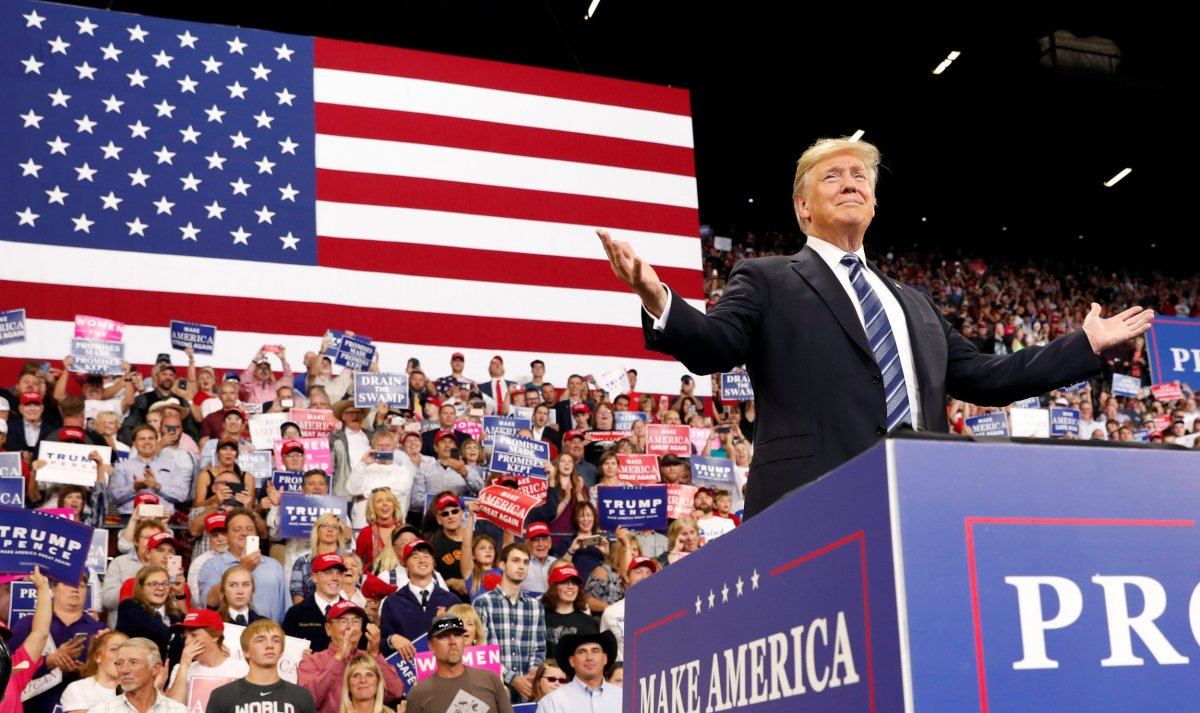President Donald Trump declared on Thursday night that the "fake news" media "excoriated" former President Abraham Lincoln for his Gettysburg Address.
"You know when Abraham Lincoln made that Gettysburg Address speech, the great speech, you know he was ridiculed?" Trump said during a rally in Billings, Montana, referring to the speech delivered by Lincoln in Gettysburg during the Civil War in 1863, reported The Hill.
"And he was excoriated by the fake news. They had fake news then. They said it was a terrible, terrible speech."

Trump then goes on to compare himself to the former president, saying that Lincoln's speech only became respected 50 years after he was assassinated in 1865.
"Fifty years after his death they said it may have been the greatest speech ever made in America," Trump continued. "I have a feeling that's going to happen with us. In different ways, that's going to happen with us."
Trump's comments were made on Thursday evening as part of a long-winded speech given at a campaign rally for Matt Rosendale, the GOP Senate candidate who is challenging Democratic Sen. Jon Tester in Billings, Montana.
"Jon Tester will never drain the swamp because he happens to live in the swamp and he loves the swamp," Trump said
Following Trump's speech, several critics took to social media to point out the inaccuracies in Trump's Gettysburg claim.
"The coverage of President Lincoln's address in The New York Times was quite favorable, actually," Washington lawyer George Conway tweeted, alongside links to archived Times articles from 1863.
The coverage of President Lincoln’s address in the New York Times was quite favorable, actually:https://t.co/ipsgvOusbghttps://t.co/5umCU6yq1I https://t.co/8DmK3LphWN
— George Conway (@gtconway3d) September 7, 2018
Former President Abraham Lincoln delivered the Gettysburg Address on a battlefield in 1863, months after the Union armies defeated the Confederacy armies at the Battle of Gettysburg. The 272-word address is now one of the best-known speeches in American history.
During the address, Lincoln carefully cites the principles of human equality guaranteed by the Declaration of Independence and explained that the Civil War was a struggle that would bring true equality to all Americans.
According to the Cornell University Library copy of the Gettysburg Address, it reads:
"Fourscore and seven years ago our fathers brought forth, on this continent, a new nation, conceived in liberty, and dedicated to the proposition that all men are created equal. Now we are engaged in a great civil war, testing whether that nation, or any nation so conceived, and so dedicated, can long endure. We are met on a great battle-field of that war. We have come to dedicate a portion of that field, as a final resting-place for those who here gave their lives, that that nation might live. It is altogether fitting and proper that we should do this. But, in a larger sense, we cannot dedicate, we cannot consecrate—we cannot hallow—this ground. The brave men, living and dead, who struggled here, have consecrated it far above our poor power to add or detract. The world will little note, nor long remember what we say here, but it can never forget what they did here. It is for us the living, rather, to be dedicated here to the unfinished work which they who fought here have thus far so nobly advanced. It is rather for us to be here dedicated to the great task remaining before us—that from these honored dead we take increased devotion to that cause for which they here gave the last full measure of devotion—that we here highly resolve that these dead shall not have died in vain—that this nation, under God, shall have a new birth of freedom, and that government of the people, by the people, for the people, shall not perish from the earth."
Uncommon Knowledge
Newsweek is committed to challenging conventional wisdom and finding connections in the search for common ground.
Newsweek is committed to challenging conventional wisdom and finding connections in the search for common ground.
About the writer
To read how Newsweek uses AI as a newsroom tool, Click here.








